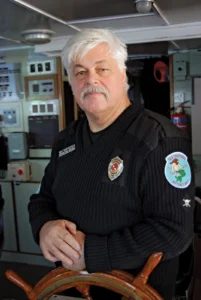Denmark Should Not Extradite Paul Watson to Japan*
Every age needs heroes. Even more so an age dominated by new wars and new dangers.
Heroes are usually handsome, courageous and committed to the defense of the weak, especially innocents whose lives are being threatened for no good reason.
Paul Watson, who has been apprehended in Greenland in relation to a Red Notice issued by Japan in 2012,[i] has an impressive image, with bright eyes and lots of hair, now white. He has repeatedly riskedhis life to defende of innocents.. It all started, he said, when he first looked into the eye of a dying whale: “I saw something else in that eye- it was pity. And not for himself, but for us. That we could take life so thoughtlessly, so mercilessly…”[ii]
Does it matter that the innocents Watson is defending are not members of our species? We think not. Just as race or gender are not reasons for regarding a being as a mere commodity, to be enslaved or treated as a possession, so too species membership cannot justify such a change of status. What matters – as indeed Article 13 of the Treaty on the Functioning of the European Union states – is that a being is sentient, that is, at a minimum, capable of suffering. We know that whales are capable of suffering, and when a modern harpoon fitted with penthrite grenades penetrates into a whale’s body before exploding and releasing claw-like protrusions into the flesh, the suffering must be excruciating.[iii]Nor does death come quickly. It takes from fifteen minutes to two hours during which the whale, often harpooned twice,[iv] struggles to return not only to her kin, but also to a cultural life shared with all the members of her pod.[v]

Paul Watson fought against all this – and he was not alone in his struggle. Moral arguments about the intrinsic value of whales gained public support, and advocacy groups lobbied the International Whaling Commission, with some success. Large organizations like Greenpeace sent vessels into direct clashes with whalers.[vi] Watson’s Sea Shepherd, however, was more innovative. Its audacious methods, which include ramming ships, disabling ships’ propellers, firing stink bombs, and boarding vessels, have saved thousands of whales.[vii] This radical form of activism is justified on the grounds that when international law is being violated, private citizens may play a “vigilante” role in order to compel states and private companies to respect existing rules.[viii]
Behind this claim lies the argument that international law has reached the point at which it is plausible to hold that whales have a right to life.[ix] In line with this, Watson claims a right to intervene in accordance with the UN World Charter for Nature, which allows NGOs to enforce international conservation law, specifically in areas beyond national jurisdiction. “We uphold the law; we do not break the law,“ Watson repeatedly stated.[x] Though disputed, this claim has met with wide social acceptance. Key nations such as the United States have always tolerated the activities of the Sea Shepherd Conservation Society and Australia has allowed its vessels to use its ports, ignoring Japanese pleas to prosecute their crew members. The inadmissibility of Japanese whaling, in fact, was officially confirmed when Australia sued Japan at the International Court of Justice alleging that its “scientific whaling” program was in breach of its obligations as a signatory to the International Convention for the Regulation of Whaling. In 2014 the ICJ accepted Australia’s legal argument and ruled that the program must end.[xi]
Despite this, Japan is pursuing Paul Watson again. His vessel had just docked in Nuuk to refuel when he was handcuffed on the bridge, with the police saying that his detention will be requested before a decision is made on whether he should be extradited to Japan. The vessel was intended to intercept Japan’s new mother ship, the Kangei Maru, which butchers and processes whales caught by smaller ships, and that, according to the Paul Watson Foundation, might resume high-seas whaling in the Southern Ocean and North Pacific by 2025 in violation of the commitments made after Japan’s withdrawal from the International Whaling Commision.[xii]
French president Emmanuel Macron has already stated that Denmark should not extradite Watson to Japan. We believe that all countries that take international law seriously should follow Macron’s lead.
* This editorial originally appeared in Danish. It is printed in English by permission of the authors. The original article can be read in Danish Here.
[i] Anti-whaling campaigner Paul Watson arrested in Greenland. He faces possible extradition to Japan – ABC News (go.com)
[ii] Captain Paul Watson Foundation: “It all started when Captain Paul Watson first looked into the eye of a dying whale.
“I saw something else in that eye- it was pity. And not for himself, but for us. That we could take life so thoughtlessly, so mercilessly…” Since then Captain Paul Watson has valiantly https://t.co/r51SFI8c0y” / X
[iii] The Truth about Whaling – International Marine Mammal Project (eii.org)
[iv] over 40% of killed whales suffer a long and painful death (ifaw.org)
[v] The Cultural Lives of Whales and Dolphins by Hal Whitehead and Luke Rendell – review | Science and nature books | The Guardian
[vi] See David Day, The Whale War, New York, Routledge & Kegan Paul, 1987.
[vii] See https://www.seashepherd.org.uk/news-and-commentary/news/sea-shepherd-launches-operation-relentless-its-10th-antarctic-whale-defence-campaign.html.
[viii] See Mette Eilstrup-Sangiovanni and Teale Phelps-Bondaroff’, “From Advocacy to Confrontation: Direct Enforcement by Environmental NGOs,” International Studies Quarterly, June 2014.
[ix] See Anthony D’Amato and Sudhir K. Chopra, “Whales: Their Emerging Right to Life,” American Journal of International Law85/1 (1991), 21-62.
[x] See https://www.seashepherd.org.uk/news-and-commentary/commentary/frequently-asked-questions.html
[xi] See Whaling in the Antarctic (Australia v Japan, New Zealand Intervening), at https://www.icj-cij.org/en/case/148. )
[xii] Whaling in Japan – Whale and Dolphin Conservation (whales.org)

